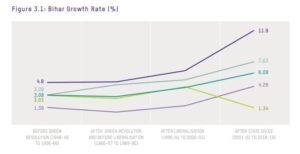In Bihar, at the two-day global investors’ summit that ended here on Thursday, officials stated that Memorandums of Understanding (MoUs) of Rs 50,530 crore were signed with almost 300 companies for planned investments in various industries.
Attending the occasion during the day, Chief Minister Nitish Kumar announced the Bihar Logistics Policy 2023, which aims to provide infrastructure facilities of international standards for the expansion of the industrial and social sectors. He did not, however, speak about the “Bihar Business Connect-2023.”
“In the areas of education, women’s empowerment, social reforms, law and order, infrastructure, and agriculture, we have made incredible strides. We’d like you to make significant investments in Bihar,” Nitish remarked.

Where are the MoU’s Investing?
Investments were made in a number of industries, including apparel, IT, agriculture, and food processing. At the largest business conference the state has hosted in ten years, the state government enticed potential investors with a plethora of tax breaks and subsidies in addition to the easy access to government land for lease. Attendees included business representatives from sixteen different nations.
Director of Adani Industries Pranav Adani declared that the business would invest Rs 8,700 crore in the state’s food processing, cement, logistics, and other industries. “We intend to increase our investment in Bihar tenfold, having already invested Rs 850 crore,” he declared.
MoUs worth Rs. 2,200 crore to Holtech International Inc., Rs. 2,200 crore to Bharat Petroleum Corporation Limited, Rs. 5,230 crore to Patel Agri Industries Private Limited, Rs. 2000 crore to Indo European Heart Hospitals and Research Institute Private Limited, and other companies were signed, according to the officials.
“At least 12 departments of the government have been coordinating to pave the way for hassle-free investment,” stated Bihar Industries Minister Samir Kumar Mahaseth. “We are also creating a land bank for about 3,000 acres to lease out to investors at a very affordable rate.”
Sandeep Poundrik, the assistant chief secretary for the Industry Department, stated that the state government’s many subsidies along with the ease of access to labor, markets, and raw resources made investing in Bihar profitable.
Team Industries after successful organisation of Bihar Business Connect 23, a Global Investors Summit , in which more than 600 companies from 16 countries participated and investment commitments of Rs 50000 cr were made. pic.twitter.com/irVo19c6k9
— Sandeep Poundrik (@SandeepPoundrik) December 14, 2023
How can it help Bihar?
Industries Minister Sameer Kumar Mahaseth stated the state needs three things in order to expand more quickly during the summit’s closing session.
“In Bihar, rain in Nepal causes a great deal of destruction,” he remarked. Bihar can be spared floods if a deal is made with Nepal about water management. Bihar will see a much greater acceleration of its economic development if it is granted special state status.
The third is that Bihar’s economic development will accelerate if it is added to the Special Economic Zone.” According to Mahaseth, the state has advanced quickly in the areas of roads, water, and power, making it a prime location for investment.
Sushil Kumar Modi, a former deputy chief minister of Bihar and BJP member of the Rajya Sabha, cautioned against making any firm promises made by the government during the meeting. The “Bihar Industrial Area Development Agency had cancelled about 1,200 units of the total 2,400 industrial units (that were supposed to come up)” according to him, despite the fact that the state has previously hosted investor meetings.
Individuals who were eligible for subsidies under the 2011 Industrial Policy were unable to get them. “Let us observe the outcome of this business meeting,” he remarked.
Is it a new Beginning for Bihar’s Economy?
Bihar has long been linked with poor socio-economic index scores, high rates of crime and lawlessness, and low per capita income. But things are shifting, very gradually. According to figures from the Reserve Bank of India, Bihar’s gross state domestic product increased by 11% in FY22, placing it alongside Rajasthan as one of the fastest growing states in the nation, following Andhra Pradesh.
The state’s industry has developed slowly. The state government has established a variety of bodies to quicken growth. The home industries employ the majority of workers in the manufacturing sector; the remaining people are engaged in the steel, other metal-based, and food processing industries.

The primary centers of the larger industries are Patna (light manufacturing), Baruni (petrochemicals), and Dalmianagar (paper, cement, and chemicals). The businesses derived from agriculture include the processing of sugar, tobacco, silk, and jute. Bihar is known for its traditional cottage industries, which include glassblowing, handloom goods, brassware, ceramics, and sericulture—the rearing of silkworms and the manufacturing of raw silk—as well as lac, the resin used to make shellac.
The fabric paintings depicting mythological themes that are made in and around Madhubani have turned into a valuable commodity for international trade.
The question that stays is how much will the face of Bihar change by grabbing such opportunities. And to further see how will the government progress with these global investments. Will it be beneficial for the common people and help with the economy and employment of the state?












